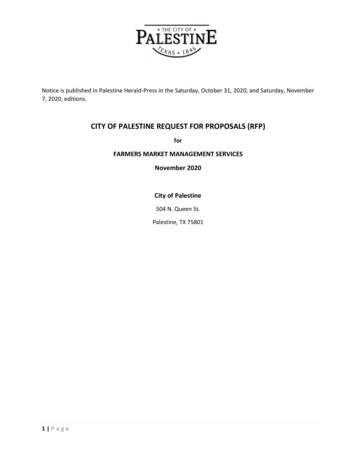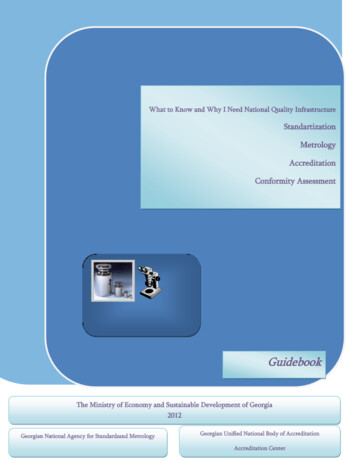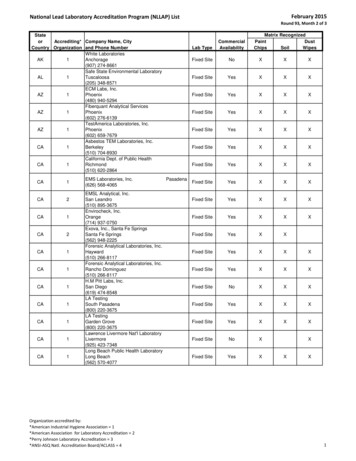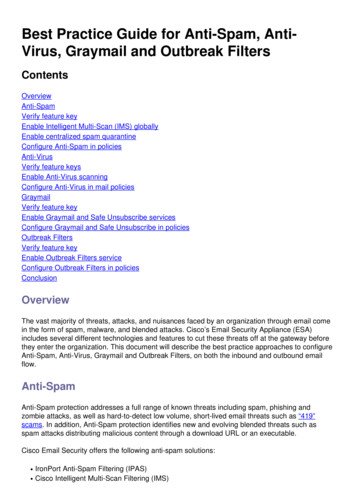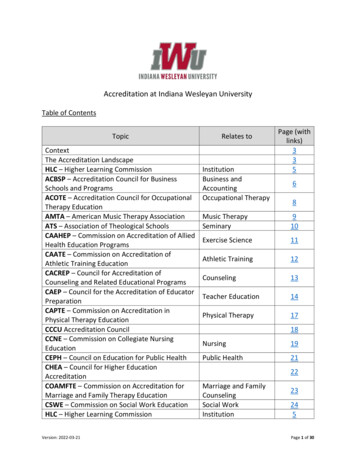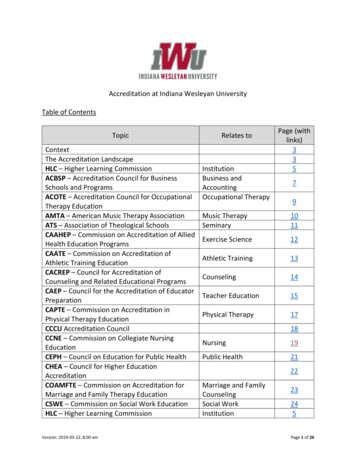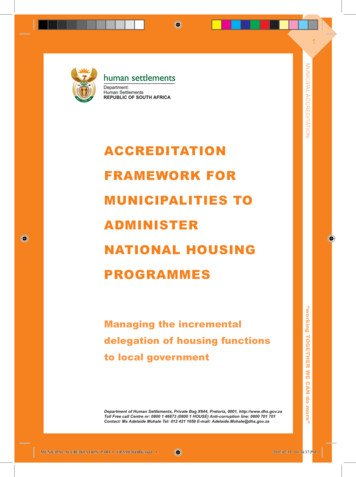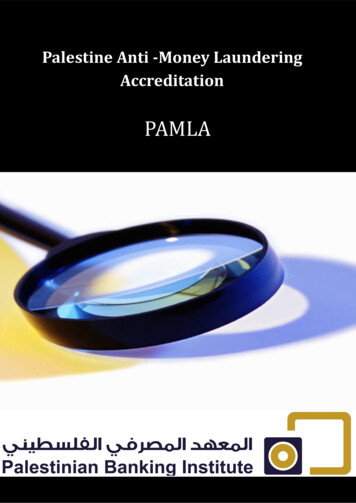
Transcription
Palestine Anti -Money LaunderingAccreditationPAMLA
Main Objectives To educate the student on what constitutes money laundering and its history To illustrate the adverse effects that money laundering/terrorist financing have on economies and the financial sector. To highlight the importance of anti-money laundering/terrorist financing efforts in Palestine or any Targetcountry. To describe international and local efforts to combat money laundering/terrorist financing. To provide guidance in compliance requirements for AML/CFT under international standards and Palestinian law. To demonstrate the inter-relationship between AML/CFT efforts and overall best practices for financial institutions To inform the student as to commonly identified indicators which may be suggestive of money launderingand other crime To describe to the student, the role of various international and governmental organizations and agenciesin the fight against money laundering/Terrorist Financing. To have the student apply the information obtained in this course to selected examples of money laundering/terrorist financing. To provide to the student basic awareness, knowledge and skills as to the nature of money laundering andwhat can be done to prevent money laundering so that the student can apply those skills in helping theirfinancial sector comply with internationally accepted financial standards.Phase I: General AML awarenessI. Introduction to Money Laundering / terrorist financing.a. What is money laundering?i. 3 phases of money launderingii. Some examplesb. History of money launderingi. Case examplesii. Legal effortsc. What is terrorist financing?II. Phases of terrorist financing.III. Some examples.a. Effects of money laundering/terrorist financing on economies and institutionsi. Types of risks1. Legal and compliance risks2. Reputational risks3. Operational risks4. Concentration Risksii. Sectors facing impact of risks1. Institutional5. Political2. Social6. Individual/Consumer3. Reputational4. EconomicComply with international and local compliance requirements; PIFBS, FFU-PMA andMFI introduce especial training course (PAMLA; Palestine Anti -Money Launderingaccreditation )
IV. Efforts to Combat Money Laundering /Terrorist financinga. FATF and other international initiativesi. What is the FATF?ii. Why the FATF became involved in AML/CFTiii. Revised 40 Recommendations1. AML vs. CFTiv. IMFv. World Bankvi. UNODCb. Regional AML/CFT effortsi. MENA FATFii. Asia Pacific (APGML)iii. MONEYVAL (European Commission)iv. Other regional organizationsc. Foreign Jurisdiction efforts (Europe, USA, etc.)i. USA Patriot Actii. Europe Directivesd. Efforts of financial institutionsi. Wolfsburg Groupe. Specialized International Organizationsi. Basel – Bankingii. IOSCO –Insurancef. General overview of Palestinian regulatory regimei. Law and regulationsii. National AML Committeeiii. Financial Follow-Up Unit (FFU)Phase II:I. Details of Palestinian regulatory regimei. AML/CFT Lawii. National AML Committeeiii. Financial Follow-Up Unit (FFU) and its roleiv. Palestine Monetary Authority (PMA)-CENTRAL Bank Role.v. Palestine Capital Markets Authority (PCMA)Program Participation Certificate Requirements:Participants Should Attend at Least 80% of the Program 70Training hours to be qualified to Attend the Certificate Exam.Fees:Members: 590 / Others: 650
II. Compliance Requirementsa. Essential components of AML complianceb. Internal policy/KYCc. Designation of compliance staffd. Monitoring and recordkeepinge. Reporting to authorities where requiredf.Training of staffg. Internal auditIII. How to Detect Money Laundering/terrorist financing?a. Types of Activities that are vulnerable to money laundering/terrorist financing.b. Financial sector and industry specific threatsc. Red-flag indicatorsd. What to do when suspicion indicates possible money launderingIV. Anti-Money Laundering/terrorist financing Efforts in Palestinea. AML law in Palestineb. Role of Financial Follow-Up UnitV. Related issues to AMLa. Prevention of predicate offences” fraud, corruption and other crimeVI. Case StudiesPhase III:I. National Compliance Concernsa. FATF and other International Recommendationsi. Go over specific recommendations and how they apply in industry specific instances in Palestineb. 40 Recommendationsc. IMF and World Bank rolesd. Mutual evaluations by regional bodiesII. Institutional Compliance Concerns/Industry Specific Concernsa. Establishing a culture of compliance within the institutioni. Adopting Company AML/CFT policy at the directors’ levelii. Building and Implementing the policy and legal requirements into an effective AMLprogram for the institution and staffiii. Selection and qualifications of compliance staff/duties and responsibilitiesiv. Training programs – what and how to implementProgram Participation Certificate Requirements:Participants Should Attend at Least 80% of the Program 70Training hours to be qualified to Attend the Certificate Exam.Fees:Members: 590 / Others: 650
b. Know Your Customer and Enhanced Due Diligencei. Customer identificationii. Customer acceptance policyiii. Expected Financial Profileiv, Customer verification and updatesv. Politically Exposed Persons and special casesvi. Monitoring for deviations from the expected profilesc. Risk Managementi. Risk based approach1. Customer base (i.e. type of business activity, etc.)2. Products3. Geographic4. Type and mode of transactionii. Collateral benefits of risk managementd. Identification of Reportable Casesi. Methodologyii. Software and databasese. Monitoring of accounts and transactionsf. Writing a report to the FFUi. Suspicious Transaction or Activity Reports1. Forms2. How to Write Reports3. Where and how to submit reportsii. Cash Transaction Reportsiii. Wire Transaction Reportsiv. Follow-up ReportsIII. Case Studiesa. How to identify indicatorsb. How to write reportsc. How to conduct monitoring and follow-up investigations?PAMLA Time Table . See thefollowing PageProgram Participation Certificate Requirements:Participants Should Attend at Least 80% of the Program 70Training hours to be qualified to Attend the Certificate Exam.Fees:Members: 590 / Others: 650
PAMLA Time 00-18:00)(9:00-18:00)(14:00-18:00)17(14:00-18:00) (14:00-18:00)16(14:00-18:00)15(14:00-18:00) (14:00-18:00)During August 2017Program Participation Certificate Requirements:Participants Should Attend at Least 80% of the Program 70Training hours to be qualified to Attend the Certificate Exam.Fees:Members: 590 / Others: 650
ii. Software and databases e. Monitoring of accounts and transactions f. Writing a report to the FFU i. Suspicious Transaction or Activity Reports 1. Forms 2. How to Write Reports 3. Where and how to submit reports ii. Cash Transaction Reports iii. Wire Transaction Reports iv. Follow-up Reports III. Case Studies a. How to identify indicators b.

